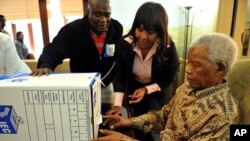South Africans vote Wednesday in local government elections many see as a test of voters’ patience with the dominant African National Congress party, which is increasingly criticized for its failures to provide basic services, for corruption, and for poor management, particularly at the local level.
A recent report by the national auditor general to the cabinet on local governments, and leaked to local media, has revealed widespread corruption, waste and incompetence. The report recommends intervention by the national government in more than a third of the country’s municipalities.
The Afrikaans language Beeld newspaper reported last week the cabinet was so concerned about the impact of the report ahead of this week’s elections it ordered the report be reworked prior to its release. The cabinet spokesperson issued a strongly worded denial, but Beeld stands by its report.
The contents of the report rings true for many South Africans, increasing numbers of whom take to the streets in regular protests because of poor or no basic services such as water and electricity, collapsing health care facilities, inadequate housing and public transport, and always, in every protest it seems, corruption.
They are especially angered when they compare their lives to those of government officials, many of whom have been severely criticized for their willingness to spend taxpayers' money on luxuries.
Mamsi Malope Malaka who lives in Sandton, says these are the things that make her feel that voting is a useless exercise.
“I feel like there is no need for me to vote because I won’t benefit at the end of the day, the only people who are going to benefit is the officials,” said Malaka.
But first-time voter Kleintje Mpoto, who lives and studies in downtown Johannesburg, says the ANC is the only party worthy of his vote.
“I think it is pretty obvious that the ANC is the only relevant organization to vote for,” said Mpoto.
Ebrahim Fakir of the Electoral Institute for the Sustainability of Democracy in Africa told a debate on the eNews television service that despite increasing frustration with the government, the ANC is likely to continue its winning streak.
“Well, I think there are going to be some surprises, but not as many as we might think there are, I think the question of Nelson Mandela Bay metropolitan [area] has been hyped up, not because of the strength of other political parties, but the ANC's challenge is going to be whether they can actually get their people out to vote,” said Fakir.
Few experts expect a major swing away from the ANC, but many are predicting that in this election voters will begin to demonstrate a loss of patience with the party. Author and analyst Pumla Qgola, speaking during the same debate, says the party likely to benefit most will be the opposition Democratic Alliance (DA).
“The ANC will win the majority, however I think it will be a shakier majority then it has ever been before," said Qgola. "I think the DA will give the ANC a big run for its money in several [metropole].”
The DA governs the Western Cape province and the city of Cape Town metropolitan area where it has won plaudits from the auditor general for efficient and honest government. The party is criticized by some for favoring wealthier areas over poor communities, but the DA says its record for service delivery to the poor is there for all to see.
Despite the widespread criticisms, the ANC remains popular and can also point to many achievements since the advent of democracy in 1994 - better access to water and electricity for millions, over two million houses for the poor, government grants for the needy, more clinics and free education.
But analysts say the ANC’s record is spotty and will have to improve dramatically for the party to halt growing frustration among voters
South Africans to Vote in Local Government Elections




